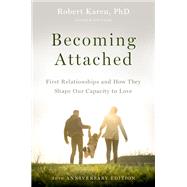Becoming Attached First Relationships and How They Shape Our Capacity to Love
, by Karen, Robert- ISBN: 9780199398799 | 0199398798
- Cover: Paperback
- Copyright: 2/12/2024
The tumultuous history of the attachment idea---and the pioneers who fought for it. Now in a fully expanded and updated 30th anniversary edition.
Robert Karen's Becoming Attached tells the story of one of the great undertakings of modern psychology: the hundred-year quest to understand what children need and what constitutes good-enough parenting.
A century ago, most childcare experts were clueless about love and its role in child development. Behaviorists warned against spoiling children with too much affection ("Never hug and kiss them, never let them sit in your lap"), while geneticists argued that parental love is irrelevant because genes alone determine who we are. Into this confusion stepped John Bowlby, the headstrong British psychoanalyst whose decades-long partnership with American psychologist Mary Ainsworth would revolutionize child development and childcare.
In recent decades attachment research has exploded worldwide, as evidence for the benefits of secure attachment grow. Numerous studies attest to attachment's critical role in emotion regulation, self-confidence, sensitivity, empathy, the capacity to forgive, and much else.
Crucial questions about child rearing can now be answered. Are babies able to handle separations from the mother? What are the risks of daycare for children under one, and what can parents do to manage those risks? How essential is the sensitivity, reliability, self-awareness, and joyfulness of parental love? And how does the nature of parental love change as the child grows older? What do live fMRI studies reveal about the neural patterns of the loving parent, which also appear in the adoring infant and in adult romance? What have we learned about parental psychology, good and bad, and how it works its way into the child? How important is the perfectly (or poorly) synchronized play between parent and baby, invisible until the advent of slow-motion video?
Karen tells a dramatic story of scientists at work and at war, what happens to research when politics and gender roles get involved, and how the nature-nurture debate shifts with the discovery that childhood experience can alter the expression of genes?
Karen shares personal anecdotes drawn from the lives of leading attachment researchers, from his patients, and from his own experience to illuminate attachment themes. He argues that we all have elements of security and insecurity in our psyches, with the insecure self readily activated in intimate relationships. He writes: "When conflicts arise, the insecure self threatens to commandeer our being, leading us, as though through quicksand, into a repetition of old patterns." And, yet, Karen contends, attachment status can change, and what he calls "seeking one's secure self" is an essential quest of mature adulthood.
For many readers Becoming Attached will be not just a voyage of discovery in child development and its pertinence to adult life, but a voyage of personal discovery as well; for it is almost impossible to read this material without reflecting on one's own life as a child, a parent, and an intimate partner in love or marriage.
Robert Karen's Becoming Attached tells the story of one of the great undertakings of modern psychology: the hundred-year quest to understand what children need and what constitutes good-enough parenting.
A century ago, most childcare experts were clueless about love and its role in child development. Behaviorists warned against spoiling children with too much affection ("Never hug and kiss them, never let them sit in your lap"), while geneticists argued that parental love is irrelevant because genes alone determine who we are. Into this confusion stepped John Bowlby, the headstrong British psychoanalyst whose decades-long partnership with American psychologist Mary Ainsworth would revolutionize child development and childcare.
In recent decades attachment research has exploded worldwide, as evidence for the benefits of secure attachment grow. Numerous studies attest to attachment's critical role in emotion regulation, self-confidence, sensitivity, empathy, the capacity to forgive, and much else.
Crucial questions about child rearing can now be answered. Are babies able to handle separations from the mother? What are the risks of daycare for children under one, and what can parents do to manage those risks? How essential is the sensitivity, reliability, self-awareness, and joyfulness of parental love? And how does the nature of parental love change as the child grows older? What do live fMRI studies reveal about the neural patterns of the loving parent, which also appear in the adoring infant and in adult romance? What have we learned about parental psychology, good and bad, and how it works its way into the child? How important is the perfectly (or poorly) synchronized play between parent and baby, invisible until the advent of slow-motion video?
Karen tells a dramatic story of scientists at work and at war, what happens to research when politics and gender roles get involved, and how the nature-nurture debate shifts with the discovery that childhood experience can alter the expression of genes?
Karen shares personal anecdotes drawn from the lives of leading attachment researchers, from his patients, and from his own experience to illuminate attachment themes. He argues that we all have elements of security and insecurity in our psyches, with the insecure self readily activated in intimate relationships. He writes: "When conflicts arise, the insecure self threatens to commandeer our being, leading us, as though through quicksand, into a repetition of old patterns." And, yet, Karen contends, attachment status can change, and what he calls "seeking one's secure self" is an essential quest of mature adulthood.
For many readers Becoming Attached will be not just a voyage of discovery in child development and its pertinence to adult life, but a voyage of personal discovery as well; for it is almost impossible to read this material without reflecting on one's own life as a child, a parent, and an intimate partner in love or marriage.






